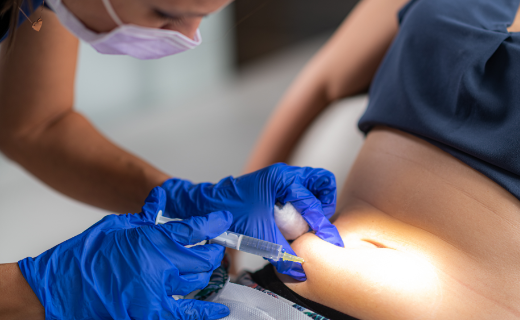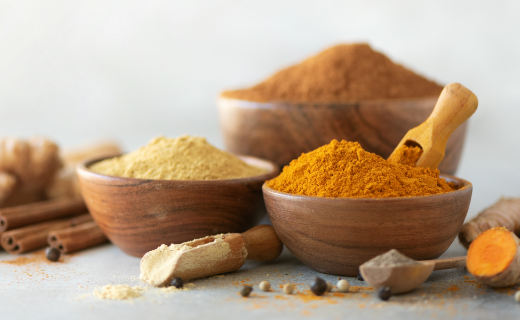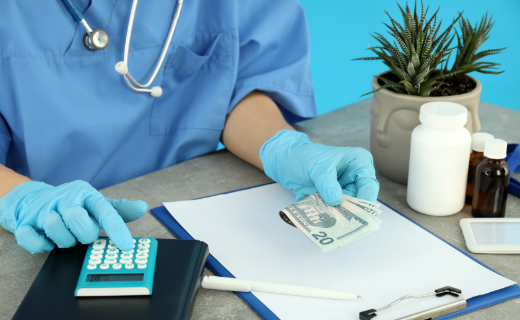
Abnehmen durch Injektionslipolyse?
Die Injektionslipoyse ist eine beliebte Behandlung in der ästhetischen Medizin, welche zur gezielten Beseitigung kleiner bis mittlerer Fettpölsterchen angewandt…

Biologics – what are they? Biologics are drugs produced by means of biotechnology, which are becoming increasingly important in healthcare. Biologics counteract immune system dysregulation by inhibiting specific receptors and immune cells.
The protein substances are therefore suitable for the treatment of dermatological diseases, including psoriasis and rheumatoid arthritis.
In Germany, sales of biologics have risen by around EUR 1 billion in each of the past few years, reaching a volume of EUR 12.4 billion in 2018.1
Looking at the sales of the Biosimilars-market in Germany, an increase in the Biosimilars shares can be observed from 32.2% in December 2018 to 48.2% in January 2020 (Fig. 1).1 By December 2020, the Biosimilar share further increased to 51%.2

Fig. 1: Dynamics of the German Biosimilar Market; modified after 1
The share of biosimilars is also comparatively high for the active ingredients relevant to dermatology:
In December 2020, infliximab took a 78.2% share of biosimilar sales, etanercept 71.6%, and adalimumab 55.6%.2
In the following section, the pathogenesis of psoriasis will be discussed in more detail, since the biologics used for treatment intervene here by inhibiting individual cytokines.
What triggers psoriasis flare-ups?
Both innate and adaptive immune processes are involved in the pathogenesis of psoriasis (Fig. 2). After activation by certain trigger factors (e.g. pathogens, drugs), keratinocytes release mediators of the innate immune defense. These may be, for example, antimicrobial peptides or chemokines.
Adaptive immune pulses
For example, the antimicrobial peptide cathelicidin LL-37 can activate dendritic cells, triggering adaptive immune processes. After activation, dendritic cells release TNF-α and IL-23 in particular.
The release of IL-23 promotes the differentiation of naïve T cells into Th17 cells, which play a key role in the pathogenesis of psoriasis. Upon activation, Th17 cells produce various proinflammatory cytokines, such as IL-17A, IL-17F, IL-22, and TNF-α.
Cytokines psoriasis
These cytokines promote immigration of other immune cells and hyperproliferation of keratinocytes. Dendritic cells also ensure differentiation of naïve T cells into Th1 cells by releasing IL-12, which produce IFN-γ, among others.3,4

Fig. 2: Main sequence of psoriasis pathogenesis; modified after 3
Which biologics are available? The following substances are currently available (as of September 2021):

In order to reduce pharmaceutical expenditures, prescriptions are increasingly regulated by target quotas of the Associations of Statutory Health Insurance Physicians German: Kassenärztliche Vereinigungen). The minimum biosimilar quotas are particularly important in the treatment of psoriasis with biologicals.
Most KVs have set minimum biosimilar quotas for the entire group of TNF-alpha inhibitors. In 2021, for example, these are 80% for dermatologists in North Rhine and 67.5% in Saxony.5,6 In Saarland, a minimum biosimilar quota for adalimumab of 80% applies to dermatologists.7
More information: KV quota check on biologicals on the DeutschenArztPortal
Rp. Institute / DeutschesArztPortal.de info@rpinstitut.com
You can subscribe to the Rp. Praxis-Newsletter here:

Abnehmen durch Injektionslipolyse?
Die Injektionslipoyse ist eine beliebte Behandlung in der ästhetischen Medizin, welche zur gezielten Beseitigung kleiner bis mittlerer Fettpölsterchen angewandt…

Antioxidants aid in the prevention of the development of chronic diseases. Common examples include compounds derived specifically from plants…

Ärztliches Honorar in der Ästhetik
Da es sich bei ästhetischen Behandlungen ausschließlich um Privatleistungen handelt, sind diese auch für die behandelnden Ärzte durchaus profitabel. Doch was ver…

We will call you back soon